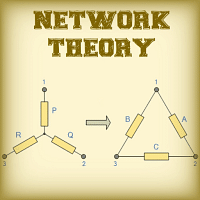Electrical Engineering (EE) Exam > Electrical Engineering (EE) Questions > Consider the following statements for a serie...
Start Learning for Free
Consider the following statements for a series RLC circuit excited with a voltage v(t)
1. For ξ, = 0, there is no-loss in the circuit.
2. The damping ratio of the circuit is independent of resistance ffofthe circuit.
3.The response of the circuit is oscillator if ξ value is more than unity.
Q. Which of the above statements is/are true?
1. For ξ, = 0, there is no-loss in the circuit.
2. The damping ratio of the circuit is independent of resistance ffofthe circuit.
3.The response of the circuit is oscillator if ξ value is more than unity.
Q. Which of the above statements is/are true?
- a)2 and 3
- b)1, 2 and 3
- c)2 only
- d)1 only
Correct answer is option 'D'. Can you explain this answer?
| FREE This question is part of | Download PDF Attempt this Test |
Verified Answer
Consider the following statements for a series RLC circuit excited wit...
 (characteristic equation)
(characteristic equation)Therefore

If R = 0, ξ = 0 (vice-versa) and for ξ < 1, response will be oscillatory.

|
Explore Courses for Electrical Engineering (EE) exam
|

|
Similar Electrical Engineering (EE) Doubts
Consider the following statements for a series RLC circuit excited with a voltage v(t)1. For ξ, = 0, there is no-loss in the circuit.2. The damping ratio of the circuit is independent of resistance ffofthe circuit.3.The response of the circuit is oscillator if ξvalue is more than unity.Q.Which of the above statements is/are true?a)2 and 3b)1, 2 and 3c)2 onlyd)1 onlyCorrect answer is option 'D'. Can you explain this answer?
Question Description
Consider the following statements for a series RLC circuit excited with a voltage v(t)1. For ξ, = 0, there is no-loss in the circuit.2. The damping ratio of the circuit is independent of resistance ffofthe circuit.3.The response of the circuit is oscillator if ξvalue is more than unity.Q.Which of the above statements is/are true?a)2 and 3b)1, 2 and 3c)2 onlyd)1 onlyCorrect answer is option 'D'. Can you explain this answer? for Electrical Engineering (EE) 2024 is part of Electrical Engineering (EE) preparation. The Question and answers have been prepared according to the Electrical Engineering (EE) exam syllabus. Information about Consider the following statements for a series RLC circuit excited with a voltage v(t)1. For ξ, = 0, there is no-loss in the circuit.2. The damping ratio of the circuit is independent of resistance ffofthe circuit.3.The response of the circuit is oscillator if ξvalue is more than unity.Q.Which of the above statements is/are true?a)2 and 3b)1, 2 and 3c)2 onlyd)1 onlyCorrect answer is option 'D'. Can you explain this answer? covers all topics & solutions for Electrical Engineering (EE) 2024 Exam. Find important definitions, questions, meanings, examples, exercises and tests below for Consider the following statements for a series RLC circuit excited with a voltage v(t)1. For ξ, = 0, there is no-loss in the circuit.2. The damping ratio of the circuit is independent of resistance ffofthe circuit.3.The response of the circuit is oscillator if ξvalue is more than unity.Q.Which of the above statements is/are true?a)2 and 3b)1, 2 and 3c)2 onlyd)1 onlyCorrect answer is option 'D'. Can you explain this answer?.
Consider the following statements for a series RLC circuit excited with a voltage v(t)1. For ξ, = 0, there is no-loss in the circuit.2. The damping ratio of the circuit is independent of resistance ffofthe circuit.3.The response of the circuit is oscillator if ξvalue is more than unity.Q.Which of the above statements is/are true?a)2 and 3b)1, 2 and 3c)2 onlyd)1 onlyCorrect answer is option 'D'. Can you explain this answer? for Electrical Engineering (EE) 2024 is part of Electrical Engineering (EE) preparation. The Question and answers have been prepared according to the Electrical Engineering (EE) exam syllabus. Information about Consider the following statements for a series RLC circuit excited with a voltage v(t)1. For ξ, = 0, there is no-loss in the circuit.2. The damping ratio of the circuit is independent of resistance ffofthe circuit.3.The response of the circuit is oscillator if ξvalue is more than unity.Q.Which of the above statements is/are true?a)2 and 3b)1, 2 and 3c)2 onlyd)1 onlyCorrect answer is option 'D'. Can you explain this answer? covers all topics & solutions for Electrical Engineering (EE) 2024 Exam. Find important definitions, questions, meanings, examples, exercises and tests below for Consider the following statements for a series RLC circuit excited with a voltage v(t)1. For ξ, = 0, there is no-loss in the circuit.2. The damping ratio of the circuit is independent of resistance ffofthe circuit.3.The response of the circuit is oscillator if ξvalue is more than unity.Q.Which of the above statements is/are true?a)2 and 3b)1, 2 and 3c)2 onlyd)1 onlyCorrect answer is option 'D'. Can you explain this answer?.
Solutions for Consider the following statements for a series RLC circuit excited with a voltage v(t)1. For ξ, = 0, there is no-loss in the circuit.2. The damping ratio of the circuit is independent of resistance ffofthe circuit.3.The response of the circuit is oscillator if ξvalue is more than unity.Q.Which of the above statements is/are true?a)2 and 3b)1, 2 and 3c)2 onlyd)1 onlyCorrect answer is option 'D'. Can you explain this answer? in English & in Hindi are available as part of our courses for Electrical Engineering (EE).
Download more important topics, notes, lectures and mock test series for Electrical Engineering (EE) Exam by signing up for free.
Here you can find the meaning of Consider the following statements for a series RLC circuit excited with a voltage v(t)1. For ξ, = 0, there is no-loss in the circuit.2. The damping ratio of the circuit is independent of resistance ffofthe circuit.3.The response of the circuit is oscillator if ξvalue is more than unity.Q.Which of the above statements is/are true?a)2 and 3b)1, 2 and 3c)2 onlyd)1 onlyCorrect answer is option 'D'. Can you explain this answer? defined & explained in the simplest way possible. Besides giving the explanation of
Consider the following statements for a series RLC circuit excited with a voltage v(t)1. For ξ, = 0, there is no-loss in the circuit.2. The damping ratio of the circuit is independent of resistance ffofthe circuit.3.The response of the circuit is oscillator if ξvalue is more than unity.Q.Which of the above statements is/are true?a)2 and 3b)1, 2 and 3c)2 onlyd)1 onlyCorrect answer is option 'D'. Can you explain this answer?, a detailed solution for Consider the following statements for a series RLC circuit excited with a voltage v(t)1. For ξ, = 0, there is no-loss in the circuit.2. The damping ratio of the circuit is independent of resistance ffofthe circuit.3.The response of the circuit is oscillator if ξvalue is more than unity.Q.Which of the above statements is/are true?a)2 and 3b)1, 2 and 3c)2 onlyd)1 onlyCorrect answer is option 'D'. Can you explain this answer? has been provided alongside types of Consider the following statements for a series RLC circuit excited with a voltage v(t)1. For ξ, = 0, there is no-loss in the circuit.2. The damping ratio of the circuit is independent of resistance ffofthe circuit.3.The response of the circuit is oscillator if ξvalue is more than unity.Q.Which of the above statements is/are true?a)2 and 3b)1, 2 and 3c)2 onlyd)1 onlyCorrect answer is option 'D'. Can you explain this answer? theory, EduRev gives you an
ample number of questions to practice Consider the following statements for a series RLC circuit excited with a voltage v(t)1. For ξ, = 0, there is no-loss in the circuit.2. The damping ratio of the circuit is independent of resistance ffofthe circuit.3.The response of the circuit is oscillator if ξvalue is more than unity.Q.Which of the above statements is/are true?a)2 and 3b)1, 2 and 3c)2 onlyd)1 onlyCorrect answer is option 'D'. Can you explain this answer? tests, examples and also practice Electrical Engineering (EE) tests.

|
Explore Courses for Electrical Engineering (EE) exam
|

|
Suggested Free Tests
Signup for Free!
Signup to see your scores go up within 7 days! Learn & Practice with 1000+ FREE Notes, Videos & Tests.























